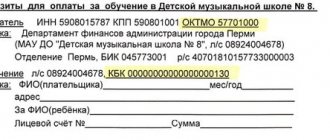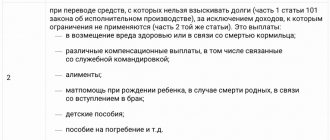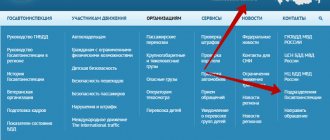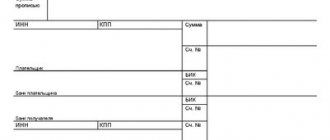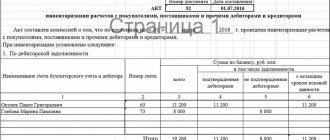Payment order to bailiffs
After the court renders a verdict on the guilt of a citizen or company and imposes a fine, the bailiff service begins to work. The latter generate payment orders and send them by Russian post:
- for individuals: at the registration address or to the organization in which the citizen works;
- for legal entities: to an organization in the name of the owner of the company;
- Individual entrepreneur: at the entrepreneur’s registered address.
The payment is needed by FSSS employees to confirm the payment of debt money under the writ of execution. The contents of the receipt have two types: for withholding tax and non-tax arrears.
The latter include alimony, credit loans, etc. The budget classification code in the Purpose of payment field of the receipt is indicated only when paying tax debts.
Extra-budgetary arrears are characterized by the corresponding word or code, which is provided by clause 7
Appendix No. 2 according to Order of the Ministry of Finance of Russia No. 107n dated November 12, 2013 (as amended on April 5, 2017).
Having received a payment slip, a citizen does not need to pay the debt on his own, since FSSS employees often write off money from the debtor’s salary or from the company’s current account. If an individual does not work anywhere, then the citizen’s property is confiscated for the amount owed.
In such a situation, no payment orders will be received.
If you do not take the payment of the debt under the writ of execution seriously and do not pay the money, then a fine is imposed - an enforcement fee, which is 7% of the accrued amount calculated for payment. The BCC of the enforcement fee differs from the codes for other payments to the federal budget.
Example
An individual, Vitaly Nikolaevich Golovin, who was obliged to pay an administrative fine in the amount of 1000 rubles, avoided this obligation in every possible way. The court decided, for failure to pay an administrative fine, to oblige Golovin to pay it twice the amount. That is, administrative liability for a given individual for failure to pay a fine will be a fine of 2,000 rubles.
The employer may receive a writ of execution from a bailiff or from the claimant himself (for example, from the employee’s ex-wife). It is imperative to inform the employee about the receipt of the writ of execution and obtain his signature stating that he knows about the receipt of the writ of execution (letter of Rostrud dated December 19, 2007.
Rules for filling out a payment order
Since the receipt form is regulated at the legislative level, the rules for filling it out are also regulated by law. A receipt is drawn up in accordance with Appendix No. 2 of Order of the Ministry of Finance of Russia No. 107n dated November 12, 2013 (as amended.
04/05/2017). The Regulations of the Bank of the Russian Federation provide information about each payment cell.
Expert opinion
Soloviev Andrey Yurievich
Practitioner lawyer with 6 years of experience. Specialization: civil law. Has experience in defense in court.
The encrypted instructions are in Appendix 3, and their decryption is in Appendix 1. Thus, before transferring the employee’s debt money to the budget, the accountant of the company in which the debtor citizen works will draw up the payment as follows:
- Fill in the employee’s TIN, indicate 0 in the checkpoint field, and the organization will be the payer.
- The debtor's position is 19. This means that the company calculates the amount accrued for debt repayment from the salary of the individual debtor. All statuses are indicated in Appendix 5 of Order No. 107n of the Ministry of Finance of Russia.
- To confirm your identity, in field 108, indicate a passport coded with the number 01. After entering the number 01, the accountant writes information about the passport from the second page, separated by a semicolon.
- The bailiff service - FSSP - is indicated as the recipient: they write the corresponding OKTMO number, and the UIN - 0.
After this procedure, the funds calculated for payment are debited from the employee’s salary and transferred to the budget.
Another example of calculations for a writ of execution is offered by Letter of the Ministry of Taxes of the Russian Federation No. BG-6-10/253 dated 03/05/2002 under number 10. The letter provides examples of filling out payment orders for different situations. Number 10 shows an example of a receipt filled out by an organization that reimburses a tax debt.
KBK bailiffs
Bailiffs order various types of payments: alimony, arrears on loans or taxes. But there are fixed types of payments to the federal budget, which correspond to a code that classifies payments. At the legislative level, budget classification codes are established for payment:
- state fees entered into the Unified State Register of Legal Entities of a company that deals with the return of enforcement fees and works with overdue debts;
- compensation for funds spent on criminal proceedings;
- penalties and fines that are imposed on individuals and legal entities for violating judicial legislation;
- performance fee.
| Operation name | KBK |
| State duty for entering information about a legal entity into the state register of legal entities engaged in the collection of overdue debts as the main activity | 322 1 0800 110 |
| Income received as compensation to the federal budget for expenses aimed at covering procedural costs | 322 1 1300 130 |
| Performance fee | 322 1 1500 140 |
| Monetary penalties (fines) for violation of the legislation of the Russian Federation on the court and judicial system, on enforcement proceedings and court fines | 322 1 1600 140 |
Results
Payments to the FSSP are a transfer there of funds withheld by the employer from the employee’s salary under a writ of execution. Non-tax and tax debts can be paid in this way. In the second case, the payment document will be drawn up according to the rules applied for budget payments, but taking into account some of the features of entering data into certain fields.
Failure to take measures based on a private ruling of the court or on the proposal of a judge.
§ 3. Failure by an official to consider a private court ruling or a judge’s presentation or failure to take measures to eliminate violations of the law specified in the ruling or presentation shall entail the imposition of an administrative fine in the amount of five to ten times the minimum wage (Article 17.4 of the Administrative Code).
§ 4. Judicial fines are imposed for:
— failure to comply with the court’s request to present evidence for reasons recognized by the court as disrespectful (Part 3 of Article 57 of the Code of Civil Procedure);
— violation of the prohibition to perform certain actions imposed as part of measures to secure a claim (Part 2 of Article 140 of the Code of Civil Procedure);
— violation of order at a court hearing (part 3 of article 159 of the Code of Civil Procedure);
- the translator’s evasion from appearing in court or from properly performing his duties (Part 4 of Art.
He does not need to fill out tax fields, indicating the payer status, BCC, etc.
Such an order must include the following information:
- Nature of payments (for example, alimony deductions).
- Details of the writ of execution according to which deductions are collected.
- Enforcement case number.
- Information about the person in whose favor payments are made.
Additional information that should be included in the payment can always be clarified with the employees of the Federal Bailiff Service.
When transferring taxes, the payment document must include the following information:
- TIN of the person who is the payer.
- Checkpoint of the citizen from whom deductions are made.
- The name of the payer is the organization that transfers the amounts of money collected from the individual.
- Payer status.
Criminal Code of the Russian Federation, administered by the Federal Bailiff Service. These fines must be calculated on the basis of Art.
46 of the Budget Code of the Russian Federation to the budgets of city districts and municipal districts, federal cities of Moscow and St. Petersburg at the location of the court that made the decision to impose a fine, and reflected in the CBC “322 1 16 21030 01 0000 140 Monetary penalties (fines) and other amounts recovered from persons guilty of committing crimes and in compensation for damage to property, credited to local budgets.”
Kbk for paying alimony to bailiffs 2021
For example, this could be transport tax, debts to the Federal Tax Service, etc. and so on. It is worth noting that it will most likely not be possible to clarify this information with FSSP employees or your bailiff directly. They do not and should not have the necessary accounting skills.
A convenient (relatively) electronic service appeared only at the end of last year. As a result, I received an angry letter from the Pension Fund of the Russian Federation, I knew how much money should be left on the PC, and after 2-3 weeks they wrote it off from there themselves.
Changes in 2021
Professional standard HR specialist 2019
Who, according to the Constitution of the Russian Federation, does not have the right to vote
What is the diameter of the intake manifold?
Written document life threat
Sochi school tickets
Sample application for a refund for goods of proper quality
In 2021, new standards for the use of BCC were developed. Some codes have been removed and new ones have been added.
In addition to the listed changes related to the simplified tax system and insurance premiums, there are others that are no less important.
Since 2021, the following main innovations have occurred:
- The number of codes intended for personal income tax payment has increased.
Kbk when transferring to bailiffs for an employee in 2021
Civil Code of the Russian Federation Procedure for closing a letter of credit Art. No. 874 of the Civil Code of the Russian Federation General provisions on settlements Art. No. 875 of the Civil Code of the Russian Federation How the process of executing a cash order is carried out Art. No. 876 of the Civil Code of the Russian Federation What are the notifications about transactions carried out Art. No. 877 of the Civil Code of the Russian Federation List of general provisions on settlements carried out by checks Art. No. 878 of the Civil Code of the Russian Federation What details should be indicated on the check of Art. No. 879 of the Civil Code of the Russian Federation The process of payment by check Art. No. 880 of the Civil Code of the Russian Federation How is the transfer of rights to an ordinary check Art. No. 881 of the Civil Code of the Russian Federation carried out? What is a guarantee of payment, how it is carried out Art. No. 882 What is collection of a check, the main features of this procedure Art. No. 883 What does a certificate of refusal to pay a check look like Art. No. 884 Notice of the procedure for non-payment of a check Art. No. 885 What are the consequences of non-payment of a check If possible before To begin drawing up the type of document in question, it is worth carefully studying the legislative acts indicated above. Today, in accordance with legislative norms, the collection of debts of various types is carried out by special bodies - bailiffs.
These bodies may draw up special documents of a certain type. They can perform a variety of functions.
At the same time, most often all kinds of organizations and institutions receive payment. It is a document that prescribes the repayment of any debts.
For example, deductions are made from an employee’s salary due to the need to repay alimony debt or other payments.
A fine will have to deal with bailiffs if he avoids fulfilling his court obligations in every possible way. In this case, he avoids paying the fine to which he is obliged to spend the funds.
It is this executive body that must ensure that the calculated fine and penalties are transferred to the state budget. How to force someone to pay a fine In this case, of course, no violent measures will be used.
How to force someone to pay a fine
In this case, naturally, no violent measures will be used. If a person has a debt to the state budget or to another individual and the court has decided to collect the amount of the fine from him, then the bailiffs will search for a method of implementing the court order legally.
One of these is the obligation of the debtor’s employer to transfer the amount of the fine calculated for payment to the state budget by withdrawing it from the wages accrued to the debtor. In this case, of course, all calculations must have a justification and confirm their legality with documents. Bailiffs, obliging the employer to collect money from the state budget, will provide him with the necessary documents to validate the procedure in accounting.
This document substantiating the legality of the deductions made from wages is a writ of execution. It is there that the necessary details for payment are indicated, as well as the legal grounds for withdrawing the required amount, which will then be used by accountants when conducting accounting and reporting. Indeed, in this case, taxation will take place with some nuances.
CBC for enforcement proceedings by bailiffs 2021-2020
Budget income classification codes are divided not only by type of payment, but also by purpose. The payment of funds ordered by a court verdict is called payment under a writ of execution.
In order to pay a particular debt according to a court decision, you need to indicate in the payment order the details of the KBK according to the bailiffs’ writ of execution for 2021. In 2021, the ciphers of the corresponding year were used.
This article presents codes and a sample for filling out a payment order to bailiffs, since the preparation of this documentation has nuances.
Appendix No. 2 according to Order of the Ministry of Finance of Russia No. 107n dated November 12, 2013 (as amended on April 5, 2020).
Having received a payment slip, a citizen does not need to pay the debt on his own, since FSSS employees often write off money from the debtor’s salary or from the company’s current account. If an individual does not work anywhere, then the citizen’s property is confiscated for the amount owed.
In such a situation, no payment orders will be received.
Methods of payment to bailiffs
Currently, there are several options for repaying debt and transferring funds to the SSP account:
- From a mobile phone account.
- Using the electronic payment of Robokassa. In this case, it should be taken into account that a one-time payment cannot exceed the amount of 15 thousand rubles and a commission of 3% plus an additional 20 rubles is charged for its execution.
- Via Qiwi wallet. The payment also cannot exceed 15 thousand rubles.
- Using the WebMoney electronic wallet. Anyone who has the opportunity to use this resource can transfer any amount without restrictions.
A sample entry of the BCC (for 2021) for transfer to bailiffs according to a writ of execution is as follows:
Filling out a payment order is a task that requires at least attention. It is necessary to observe the order in which all numbers are entered. Anyone who encounters this system needs to have information on filling out the BCC and other information for deducting the enforcement fee of bailiffs in 2021.
KBC on the writ of execution of bailiffs 2018
The video will talk about enforcement proceedings:
Attention! Due to recent changes in legislation, the legal information in this article may be out of date!
Our lawyer can advise you free of charge - write your question in the form below:
Kbk for transferring alimony for an employee to the bailiff service 2021
Important! If the court decision requires immediate action, then the period for notification by the bailiff of the debtor will be one day from the date of receipt of the court order. To obtain satisfaction of the claim, the payer must collect the following evidence: Please note!
Download and print a sample claim from this link.
- Legislation changes regularly and laws are amended, so the information on the site may not be complete.
- We recommend that you contact our lawyers for a free consultation. Ask a question right now!
Kbk when transferring alimony to bailiffs
Dear readers! Our articles talk about typical ways to resolve legal issues, but each case is unique. If you want to find out how to solve your particular problem, please use the online consultant form on the right or call the numbers provided on the website.
It's fast and free! After the entry into force of Chapter 34 of the Tax Code of the Russian Federation, insurance premiums directed to:.
Budget income classification codes are divided not only by type of payment, but also by purpose. The payment of funds ordered by a court verdict is called payment under a writ of execution.
In order to pay a particular debt according to a court decision, you need to indicate in the payment order the details of the KBK according to the writ of execution of the bailiffs of the year. In the year, the ciphers of the corresponding year were used.
This article presents codes and a sample for filling out a payment order to bailiffs, since the preparation of this documentation has nuances.
KBK-insurance premiums (old periods)
If you need to transfer to the INFS contributions to compulsory medical insurance, compulsory medical insurance or VNIM for periods that expired before 01/01/2017, then they are transferred to the KBK, different from the “fresh” KBK:
| Type of insurance premium | KBK (for contribution) | KBK (for penalties) | KBK (for a fine |
| Insurance premiums for OPS | 182 1 0200 160 | 182 1 0200 160 | 182 1 0200 160 |
| Insurance premiums for VNiM | 182 1 0200 160 | 182 1 0200 160 | 182 1 0200 160 |
| Insurance premiums for compulsory medical insurance | 182 1 0211 160 | 182 1 0211 160 | 182 1 0211 160 |
| Insurance premiums for compulsory health insurance in a fixed amount | 182 1 0200 160 | 182 1 0200 160 | 182 1 0200 160 |
| Insurance premiums for compulsory health insurance in a fixed amount (1% contributions) | 182 1 0200 160 | 182 1 0200 160 | 182 1 0200 160 |
| Insurance premiums for compulsory medical insurance in a fixed amount | 182 1 0211 160 | 182 1 0211 160 | 182 1 0211 160 |
Details for paying debts at the bailiff service of the Pervomaisky district
In addition, in the menu that appears as a list of payment options, you can familiarize yourself with all the ways to repay the debt to the FSSP for your enforcement proceedings. Perhaps you can find a payment option that is more convenient and economical for you.
The signs “No” and “–” are not indicated in field 108. If the individual’s TIN is filled in, the value “0” is allowed in this field.
- In fields 106 “Base of document”, 107 “Tax period” and 109 “Date of document” enter 0.
Sample of filling out a payment order to bailiffs For clarity, let’s look at filling out a payment order to the FSSP using a conditional example.
Methods of payment to bailiffs
Currently, there are several options for repaying debt and transferring funds to the SSP account:
- From a mobile phone account.
- Using the electronic payment of Robokassa. In this case, it should be taken into account that a one-time payment cannot exceed the amount of 15 thousand rubles and a commission of 3% plus an additional 20 rubles is charged for its execution.
- Via Qiwi wallet. The payment also cannot exceed 15 thousand rubles.
- Using the WebMoney electronic wallet. Anyone who has the opportunity to use this resource can transfer any amount without restrictions.
A sample entry of the BCC (for 2021) for transfer to bailiffs according to a writ of execution is as follows:
Filling out a payment order is a task that requires at least attention. It is necessary to observe the order in which all numbers are entered. Anyone who encounters this system needs to have information on filling out the BCC and other information for deducting the enforcement fee of bailiffs in 2021.
KBC on the writ of execution of bailiffs 2018
The video will talk about enforcement proceedings:
Attention! Due to recent changes in legislation, the legal information in this article may be out of date!
Our lawyer can advise you free of charge - write your question in the form below:
Kbk enforcement collection of bailiffs 2021 2021
There are no special rules regarding non-budgetary collections, as well as official instructions on the procedure for processing payments. Therefore, we believe that a regular payment order is issued for them, without filling out the “tax” fields, including payer status, BCC, etc. In this case, all information identifying the payment is provided in the “Purpose of payment” field.
Today, a payment order to bailiffs means a special document that contains detailed information on the purpose of the payment of the type in question. However, there are several different formats for such documentation. Information required:
Payment of alimony through bailiffs
Failure to comply with deadlines leads to the accumulation of debt. The organization may be subject to a fine or a penalty for late payment. The person making the payment must indicate the date the document was created.
The accountant of every organization needs to know how to fill out payment orders for alimony. According to the Civil Code, a payment order is an obligation of the bank to transfer money on behalf of a client from one current account to another, including if the second account is opened in another financial institution.
KBC on the writ of execution of bailiffs in 2021
If for some reason there is simply no relevant experience in drawing up such documents, then you will need to carefully read the sample. This will avoid a large number of different difficulties.
Expert opinion
Soloviev Andrey Yurievich
Practitioner lawyer with 6 years of experience. Specialization: civil law. Has experience in defense in court.
A payment order from the bailiff service is a special document containing detailed information on the purpose of payment. This payment order has the force of a judicial writ of execution.
Sequence of payment of alimony payments
The purpose of payment when transferring alimony has status No. 1. Payments from this category are considered to be made first. This category also includes payments aimed at compensating for harm to health.
The payment order form must contain answers to the following questions:
- Purposes of drawing up a payment order.
- On the basis of what document were the claims made to the recipient of funds for payment? The information is provided by the bailiff.
- The period for which the funds are transferred.
- Availability of VAT.
According to the law, value added tax is not charged for the transfer of alimony payments.
Free legal consultation by phone:
Budget classification codes according to the writ of execution of the joint venture in 2021
- TIN of the person who is the payer.
- Checkpoint of the citizen from whom deductions are made.
- The name of the payer is the organization that transfers the amounts of money collected from the individual.
- Payer status. In this case it will be 19.
- Code. If the payer has an identifier, then this should be entered.
- KBK. Such documents are marked with 0.
- The classification according to OKTMO is the one that relates to the location of the bailiff’s office to whose account the payment is made.
- A unique number of a document that can act as an identifier of an individual (for example, a civil passport number, SNILS, etc.).
Persons responsible for sending payment documents should always remember the need to be scrupulous in filling them out. Errors in this case may result in money being sent to the wrong address. And this, in turn, will lead to penalties from the Federal Tax Service.
KBK-2018 for payment of other taxes for all organizations and individual entrepreneurs
| Name of tax, fee, payment | KBK |
| Personal income tax on income the source of which is a tax agent | 182 1 0100 110 |
| VAT (as tax agent) | 182 1 0300 110 |
| VAT on imports from Belarus and Kazakhstan | 182 1 0400 110 |
| Income tax on dividend payments: | |
| — Russian organizations | 182 1 0100 110 |
| - foreign organizations | 182 1 0100 110 |
| Income tax on the payment of income to foreign organizations (except for dividends and interest on state and municipal securities) | 182 1 0100 110 |
| Income tax on income from state and municipal securities | 182 1 0100 110 |
| Income tax on dividends received from foreign organizations | 182 1 0100 110 |
| Transport tax | 182 1 0600 110 |
| Land tax | 182 1 06 0603х хх 1000 110 where xxx depends on the location of the land plot |
| Fee for the use of aquatic biological resources: | |
| — for inland water bodies | 182 1 0700 110 |
| — for other water bodies | 182 1 0700 110 |
| Water tax | 182 1 0700 110 |
| Payment for negative impact on the environment | 048 1 12 010x0 01 6000 120 where x depends on the type of environmental pollution |
| Regular payments for the use of subsoil, which are used: | |
| - on the territory of the Russian Federation | 182 1 1200 120 |
| — on the continental shelf of the Russian Federation, in the exclusive economic zone of the Russian Federation and outside the Russian Federation in territories under the jurisdiction of the Russian Federation | 182 1 1200 120 |
| MET | 182 1 07 010хх 01 1000 110 where хх depends on the type of mineral being mined |
| Corporate income tax on income in the form of CFC profits | 182 1 0100 110 |
Kbk for alimony payments
I think that if you are not married, then in accordance with paragraph 4 of Art.
11 of the Law on the Basics of Tax on Property, which is transferred by inheritance or donation of residential premises into the ownership of citizens and legal entities is carried out on the basis of a social rental agreement for residential premises in accordance with the legislation on residence with an application for the purchase of residential premises that has concluded such an agreement with it.2 .
1 and 2.1 of this article, as well as unless otherwise provided by the agreement. Article 32 of the Civil Code of the Russian Federation.
Compensation for moral harm If a citizen has suffered moral harm (physical or moral suffering) by actions that violate his personal non-property rights or encroach on intangible benefits belonging to the citizen, as well as in other cases provided for by law, the court may impose on the violator the obligation of monetary compensation for said damage. When determining the amount of compensation for moral damage, the court takes into account the degree of guilt of the offender and other circumstances worthy of attention.
The legal topic is very complex, but in this article we will try to answer the question “Kbk for alimony to bailiffs 2021.” Of course, if you still have questions, you can consult with lawyers online for free directly on the website.
“Site Administration” (hereinafter referred to as the Administration) - authorized employees to manage the site https://online-sovetnik.ru, who organize and (or) carry out the processing of personal data, and also determine the purposes of processing personal data, the composition of personal data to be processed , actions (operations) performed with personal data.1.1.2. "Personal
However, in 2021, in practice, there are cases when a legal entity (for example, a bank) needs to transfer alimony in favor of bailiffs. will indicate the employee’s tax identification number, enter 0 in the checkpoint, and designate himself as the payer; will indicate 19 as the payer status;
Today there is a promotion - consultation of lawyers and advocates 0 - rubles.
The enforcement system in Russia is structured in such a way that all debts that are collected due to the actions of UFSSP employees, according to the latest orders, initially go directly to the Service’s account.
- Fill in the employee’s TIN, indicate 0 in the checkpoint field, and the organization will be the payer.
- The debtor's position is 19. This means that the company calculates the amount accrued for debt repayment from the salary of the individual debtor. All statuses are indicated in Appendix 5 of Order No. 107n of the Ministry of Finance of Russia.
- To confirm your identity, in field 108, indicate a passport coded with the number 01. After entering the number 01, the accountant writes information about the passport from the second page, separated by a semicolon.
- The bailiff service - FSSP - is indicated as the recipient: they write the corresponding OKTMO number, and the UIN - 0.
KBK bailiffs
Alimony in favor of bailiffs
Typically, alimony is transferred in favor of the claimant. That is, the employer issues a regular payment and transfers the money to the current account of, for example, the employee’s ex-wife. However, it happens that the money first needs to be transferred in favor of the bailiffs, and not directly to the collector. There can be many reasons for this, for example:
- if there is no information about bank accounts, electronic cards opened in the name of the child or the creditor;
- if the debtor evades payment of alimony, if savings accounts or cards are discovered in banks;
- if in case of forced receipt of money - when selling the debtor’s property to cover the alimony debt.
Thus, transferring alimony in favor of bailiffs is a procedure that an employer may rarely encounter. After all, he always knows from what amount to withhold alimony, who is the debtor and to which account the salary is transferred. It is difficult to imagine that if there is a claimant, alimony must first be sent to the bailiffs. This “scheme” is, to put it mildly, very strange. However, in 2017, in practice, there are cases when a legal entity (for example, a bank) needs to transfer alimony in favor of bailiffs.
We also note that if the address of the person in whose favor alimony is being collected is unknown, the FSSP of Russia recommends transferring alimony by payment order to the settlement account of a structural unit of the territorial body of the FSSP of Russia (subclause 9 of clause II of Appendix No. 1 to the Methodological Recommendations of the FSSP of Russia dated June 19, 2012 No. 01-16).
In such a situation, you need to know how to issue a payment order for withheld alimony. Here is an example that is relevant in 2017:
Also:
This post has no comments yet.
